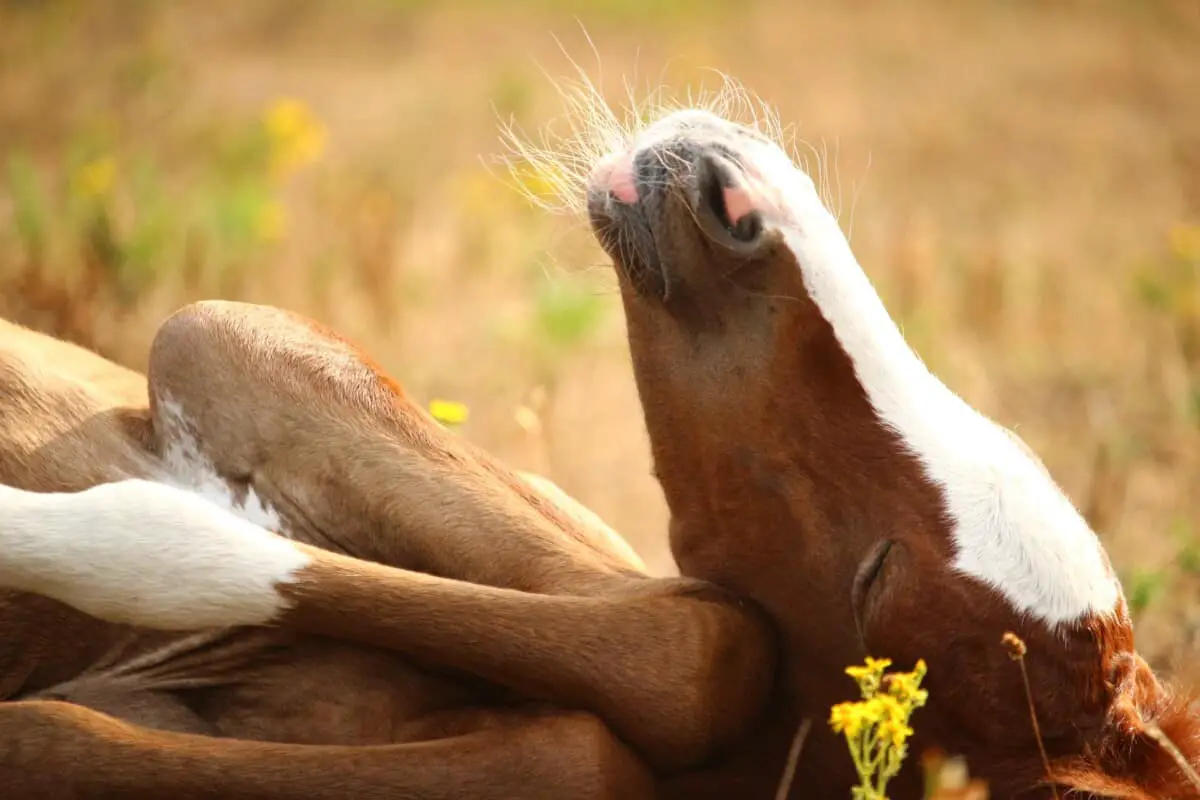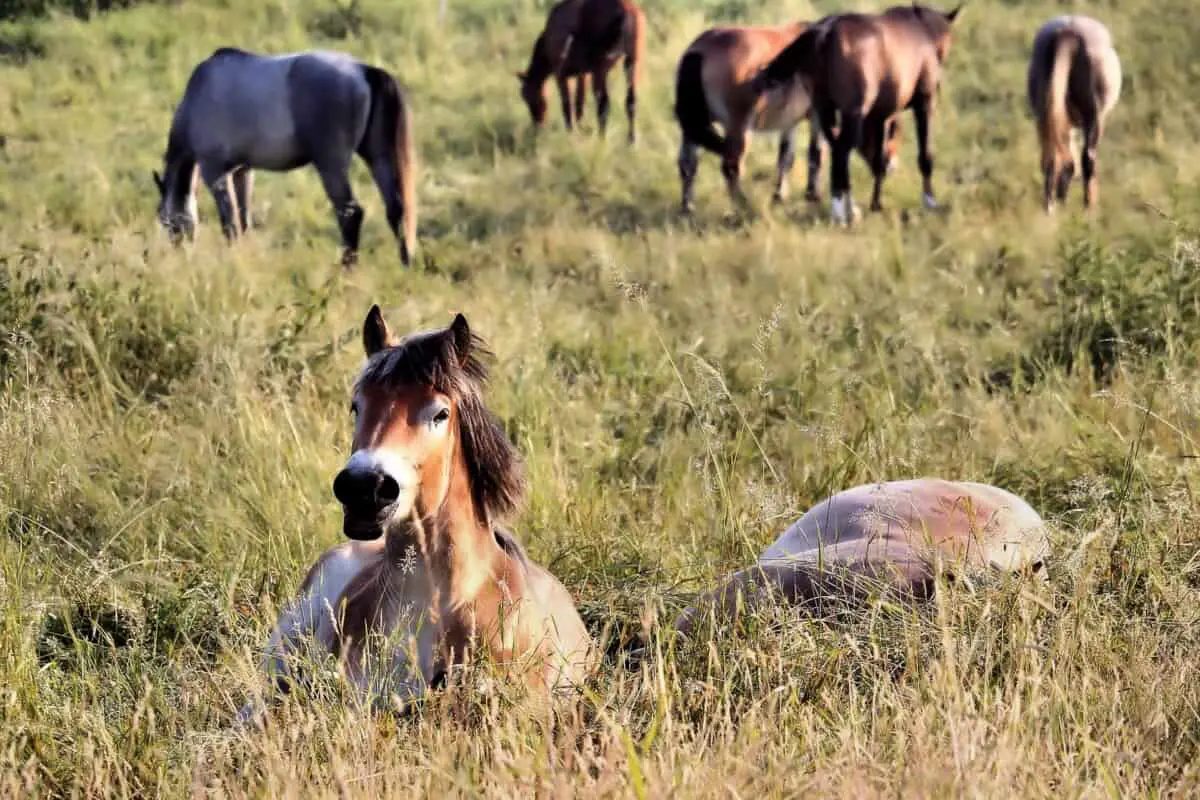Skip To Section
Adult horses can take a nap while they are standing, but they don’t fall into a deep sleep in this position. Their bodies have a unique equine system called the stay apparatus that allows them comfortably nap while standing up.
Horses nap a lot, and they get a lot of their rest by taking power naps while they are on their feet. They can take a nap in this position with their eyes open, but they also need to lie down to fall into a deep, REM sleep. Sometimes horse sleeping simply includes lying down and taking a nap because that is more comfortable than standing.
How Do Horses Sleep? – A Unique System That Allows Horses To Snooze Standing Up
Although it seems very uncomfortable, the staying apparatus allows horses to sleep standing up. The staying apparatus is a system made up of tendons and ligaments that make sure the horse is upright easily when it is napping. The major joints in its hind legs are locked, and the body remains aligned. With the soft tissues locking the bones securely, there is no exertion from the muscles, and the horse can rest without worrying about falling.
Why Horses Sleep Standing Up
Before they were tamed, horses had to protect themselves from predators. Their straight backs prevented them from getting up quickly. So, they would sleep standing up.
According to the head of the Equine Behavior Lab, University of Pennsylvania’s School of Veterinary Medicine, Sue McDonnell, Ph.D., horses have sleep patterns typically found in prey animals that evolved on open plains.
Horses have an instinct to sleep in the wild and to protect themselves. Sleeping while standing up helps them make a quick escape in case a predator attacks them. By napping while standing up, they do not have to waste time getting up, which is a slow process when compared to the speed with which a predator would attack.
A horse will sleep standing up in unsuitable environmental conditions like the lack of space to lie down, and unsuitable weather conditions.
Some horses prefer to nap standing because the environment does not feel safe, and they are afraid of being attacked.
Social insecurity, for example, low standing on the pecking order, can be a reason for horses sleeping standing up.
Horses that suffer from musculoskeletal problems might find lying down uncomfortable.

How Do Horses Sleep?
Horses require deep sleep for proper physical and mental health. Deep sleep cannot take place while standing because there is a loss of muscle tone. However, horses don’t need a lot of deep sleep or REM sleep – three or four hours in short bursts in a 24-hour period are sufficient. So, a typical night for a horse would involve grazing, napping while standing up, and short periods of lying down to get the required REM sleep.
Horses prefer to lie down and go into a deep state of sleep when it is completely dark and quiet – usually after midnight. So you might miss seeing your horse lying down and sleeping.
How Long Can A Horse Lay Down?
Horses lay down to get their required deep sleep in short bursts of 15 to 20 minutes. Most horses get up immediately when they feel uncomfortable. Some horses can lie down for a couple of hours, and that is alright as long as they can get back up on their own.
Lying down for several hours together could be dangerous for the horses. That is because the longer they lie down, the more prone they are to reperfusion injury. Reperfusion injury occurs when the weight of large animals prevents blood flow to specific locations, making standing up very difficult.
A Study On The Factors That Impact The Ability Of Horses To Lie Down
According to Kentucky Equine Research, a study on the factors that impacted the ability of horses to lie down showed that the more comfortable horses were, the more willing they were to lie down and sleep.
Horses that did not have access to bedded areas rarely laid down and got less than 30 minutes of REM sleep. However, as the dimensions of the bedded area were increased to make recumbency possible, these horses could lie down. Competition between horses lessened, and even low-ranking horses were happy to lie down and get their required REM sleep.

How To Ensure Your Horse Gets Adequate Sleep
You can make your horses comfortable and ensure they get sufficient rest from power naps and deep REM sleep. Here are some simple steps you can follow.
- Ensure all your horses have adequate room to lie down comfortably for at least 30 minutes over a 24-hour period.
- Feed your horses required doses (as prescribed by a veterinary doctor) of joint supplements. These supplements lubricate the joints and prevent discomfort and inflammation associated with osteoarthritis that prevents horses from lying down.
- Maintain your horses’ health and weight. Overweight horses find it difficult to lie down, and that limits their REM sleep.
- Provide your horses with a comfortable, relaxed, and safe environment.
- Avoid keeping your horses in noisy environments so that they feel safe.
- Although stall-kept horses can adapt to lights, they sleep much better in the dark.
Do Any Animals Sleep Standing?
To be able to sleep standing, an animal must be aligned vertically so that they don’t need the muscular effort to keep them upright. They would also need to have knees that can be “locked” into place. Elephants and zebras can sleep standing up. Cows can sleep standing up but prefer to lie down. Some birds like flamingos cannot lie down and therefore sleep standing up.
Conclusion
Horses are content with a few hours a day of deep REM sleep, but they get this deep sleep. At other times, horses are happy catching up on their power naps throughout the day.
If you are a horse owner, don’t be alarmed if you catch your horse dozing standing up, with its eyes wide open. Also remember to provide your horse with ample space and comfortable bedding so that it can lie down and sleep deeply.

